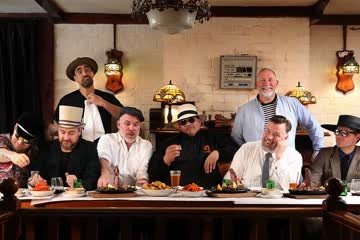Gareth Liddiard Interviews Don Walker [Part Two]
"Nah, you’re in deep Tony Abbott territory."
Gareth Liddiard: There's a song I really like: Young Girls. That's a fantastic tune. It's nicely un-politically correct, which I like. A man your age singing about young girls – its refreshing
Don Walker: Had to be very careful about that one [laughs]. I carefully explain in concerts before we start that “young girls” means people our age. We had put it out in the single sleeve. So, the guy doing the artwork sent me some artwork with the title Young Girls and a picture of me, kind of, staring meaningfully into the camera. I just went: “No, no. We have to put something on this that is not me. 'Cause there is no photo of me that is going to work with that title”. [laughs]
GL: Well, you can't really say “young women” because it doesn't sound as good as “young girls” phonetically, so….
Don't miss a beat with our FREE daily newsletter
DW: Nah, you're in deep Tony Abbott territory.
GL: It reminded me of the book Shots that you wrote, in its unashamed carnality. Most rock'n'roll and that side of popular culture is all a bit monastic these days, it's all a bit sexless. Young men these days have beards and they sing about barnyards, whiskers and woodland creatures. And all the women these days sound like their grandmothers when they sing. But Young Girls and Shots, it's still really sexy – I like that. It reminded me of Robert Drewe, the Australia writer.
DW: I know who he is but I haven't read any.
GL: Well, he's got a great book called Body Surfers. He writes in a kind of journalistic style, but he writes about all the things you pretend aren't happening in your head.
DW: Yes, I've seen that title. I think it's always dangerous in a culture where what people are allowed to say becomes too shut-off from what everybody knows they're thinking. Where language is controlled with the idea that that is going to change thinking. And it does to a certain extent. It's a brutal suppression, that one.
GL: I agree with you there. There's another great song, Everybody, and that really refers to the current state of Western culture and the obsession with celebrity and consumerism and sort of impossible beauty and porn and sex, and all that, which is odd considering these days rock'n'roll is kind of sexless. That's a great tune. But it's got a great line I was interested in that goes something like “everybody says they've been abducted by aliens” – this is something that's fascinated me. It's like a post-religious thing. It's something that happens in secular states but the oddest thing about it is, I just wanted to get your thoughts on this, why do you think so many people think they're not only abducted by aliens but, sort of, raped by them.
DW: Yeah, there's always “I was tied down and examined, or raped”.
GL: Yeah, they're never asked questions, you know?
DW: Yes, interrogated or having their toenails clipped, or something like that. I love that stuff. I used to go and buy, in a King's Cross Newsagent, The National Enquirer. That American magazine that has all that kind of stuff. And that's far more interesting than The Guardian [laughs] and no closer to reality.
GL: Too true.
DW: All that stuff, a front-page photo of somebody who's clearly had a shocking accident and underneath they've written a story about cosmetic surgery gone wrong. It's fantastic, page after page of it.
GL: It's a funny thing in a society so obsessed with denial, mainly, which is another thing – you don't really do denial in your songs, you cut to the chase. A lot of the new album – like the song On The Beach where it's about loyalty vs temptation and the perceived lives of people vs their actual hidden internal lives. Why do you write about what's really happening when everybody else is just trying to maintain being as full of shit as everybody else?
DW: I'm at least as full of shit as anybody and have been told so by those who care about me most and know me best, so let's not duck that one. I sound like Kevin Rudd, don't I? Let's cut politicians names out of this interview. On The Beach is a, I think, bloody minded act of will in the face of everything in the landscape that says this doesn't make sense. Its about people who say: “fuck the world, fuck the landscape. I will be by your side until the end of time”. It's a pure act of will in the face of all rational thought or fashion.
GL: I agree. Me and Fiona were talking about having a spine or a set of values that you just stick by through thick and thin and we were wondering where it comes from and I always grew up with dogs and, weird as it sounds, it was dogs that taught me a lot about loyalty to people and values like, love is blind, but loyalty is a dogged thing, like you say.
DW: Yes. There's not much glamorous about it, but the rewards occur at a depth that you never see unless you take that step.
GL: It's true. The album has a lot these kinds of themes on it. They fly in the face of the modern world and rampant individualism, and yeah there is a lot of that on the album. Have you always been disenfranchised with the world around you or is this a recent thing?
DW: Oh, no. I think everybody is. Through youth and middle age, I spent a lot of my time being enraged at the stupidity of what was accepted wisdom. I'm pretty calm these days, I can listen to the radio – you get to an age where everything's being enacted by younger people anyway. You can look at it all as being entertainment and not get emotional about it.
GL: I mean, you could accuse somebody who says something like that that or be disconnected or complacent. But I'm suspicious of people who accuse others of complacency especially in a world like to today, where what can you do – everything is just so… inherently stupid. [laughs]
DW: Actually, yesterday I found myself shouting at the car radio – that was Monday morning. Luckily I was alone in the car, wouldn't have done it if there was anybody else in the car. And I won't even go into what it was. It was somebody who had just revealed themselves at length to be so self-blind, talking to somebody else who didn't pick up on it. What am I listening to? Who are these people? Can they not see – anyway, I am ranting and waffling now.
GL: No, no. It makes sense to me. But this is a nice little segue into the track on the album, Pool.
DW: Ah, yeah.
GL: I mean that tune comes up twice. I'm quite fond of both versions. I really like that someone has finally written a song about pool and it contains one of life's great truths which is you gotta have a couple of beers before you can get your hand-eye coordination in order.
DW: Yes, and whether you're asking or not, I have to tell you, I am a terrible pool player. But I'm a game pool player, I'll have it on anytime and when I play pool, my first game is my best game. I can often look like quite a confident pool player in the first game or two and if I have the presence of mind to walk away then, people don't get to realise just how bad I am.
GL: [laughs] That's good, I thought you might be some sort of shark so I was worried. But I'm like you.
DW: I know some killer pool players, Glen Hannah, the guitar player in our band is lethal, Jim Barnes is pretty good. Tex [Perkins] is really good.
GL: Really? Tex? I can believe Jimmy's good but I'm having trouble with Tex. [laughs]
DW: And Wilbur Wilde – very handy pool player. But it's one of those things, if you're a lead singer, if you're the out the front lead singer which I certainly don't class myself as and I don't think you would class yourself as that – maybe you do.
GL: Aw, I feel like a guitar player that has to sing because no one else will.
DW: Yeah, so that lets you off the hook. But if you're like a Tex or Jim type person who gets out the front with the mic stand and is basically putting it to them, it's obligatory – don't even think about that unless you're a seriously good pool player.
GL: [laughs]
DW: It's just an obligatory part of the skill set.
GL: So true.
DW: If you get up on stage and do that, and then you go later and reveal yourself to be a poor pool player, well then you're a fraud.
GL: You lose all credibility, you're a charlatan. Another thing about that song, it has never occurred to me that one of the true pleasures of playing pool is a – what do you say – “give the afternoon away”, it's nice to feel like a bit of reprobate and a rebel by wasting time and not being out in the world and making money for everyone else. And that's one of the charms of playing pool.
DW: Or even for your family.
GL: Or any responsibility.
DW: I'm not going to make money, I'm going to completely waste my life for a few hours, and it's kind of admirable in a way. I haven't had enough of that myself. I admire people who do it.
GL: Yeah, I do too. I really do. So anyway, what have you got coming up? You've got a tour, you're playing Gympie Muster, I see.
DW: Yeah, we have to do Gympie Muster. And then I've got a couple of months in September and October before we do a little bit of touring through November, only Sydney, Brisbane and Melbourne.
GL: How do people in country towns respond to a band called the Suave Fucks?
DW: Well honestly, mostly that gets a pretty positive reaction, I think. I've never had – yeah, but people who don't like that, they wouldn't come up and tell you anyway. It's like with your music. If you regard the people who come up and say they like your music as being a comprehensive sample of the population, you're deluding yourself because the ones who hate it, they never come up and talk to you at all.
GL: Yeah, they wouldn't, yeah.
DW: And the Suave Fucks are the same.
GL: Yeah, it's a great name. Whose idea was that?
DW: It came from Michael Vidale – the bass player, and it's actually a line out of Blue Velvet. Dennis Hopper says to Kyle MacLachlan: “Man, you are one suave fuck”.
GL: That's nice. Classy.
DW: A great Dennis Hopper line to a guy who went on twenty years later to star in Sex And The City.
GL: True. I don't watch Sex And The City like you, so I wouldn't know. [laughs]
DW: Yeah, but I bet you know people that do.
GL: I do. I'm not naming them in public.
DW: I won't name names either. We all know people who watch Sex And The City.
GL: It's true. And that's why we're musicians. That's why we do what we do.







